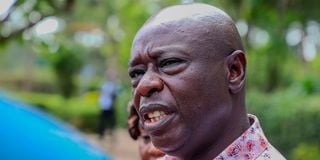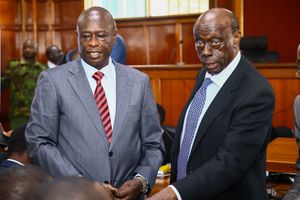Senate impeachment process was half-baked and incomplete

Impeached Deputy President Rigathi Gachagua addressing journalists outside Karen Hospital, Nairobi, on October 20, 2024.
What you need to know:
- Where was the report showing the particulars of the allegations that were substantiated? When was the DP provided with the report containing the particulars of substantiated allegations to enable him to know what the committee had decided? When was he given the “opportunity to be heard” regarding the findings of the committee?
The Senate missed a critical constitutional step of the impeachment process during its removal proceedings against Rigathi Gachagua and hence its proceedings remain incomplete. Let me explain.
Article 145, when read with Article 150, dictates two substantive processes at the Senate that must be undertaken in the impeachment of the deputy president (DP). They are, firstly, an investigation by a special committee of the senate of the allegations that made the national assembly resolve that the DP should be impeached.
Secondly, the consideration by the senate of the report by the special committee regarding the allegations the special committee finds were substantiated before voting on the removal of the deputy president.
The committee stage and investigations
To be specific, Article 145 requires the Senate to form a “special committee” of 11 members after receiving a resolution of the National Assembly to impeach a DP. Sub-article 145(4) is critical.
It states that the special committee shall “investigate the matter, and report to the Senate within 10 days whether it finds the particulars of the allegations against the [Deputy] President to have been substantiated.” Five words in that section are instructive: investigate; report; particulars; allegations; and substantiated.
Let’s look at the importance of each of those words, but before we do a reminder. The Senate did not form the 11-member committee.
Instead, it chose to sit as a “committee of the whole house” meaning this whole house committee substituted the special committee of the 11. The point here is that the committee of the whole house assumed the constitutional tasks of the “special committee” of 11.
Simply then, the constitutional task of the committee of the whole house was to investigate the allegations that resulted in the national assembly resolution on impeachment, find particulars that supported any of the allegations, determine whether any of the allegations were substantiated, then file a report with the Senate on its findings.
Article 145(5) then creeps in here. That is, when the committee is investigating the allegations, the DP has a right to “appear and be represented”.
The drama we witnessed in the Senate, starting with Mutuse Mwengi’s testimony to the Members of the National Assembly and Senators giving their opinion on the night of October 17th on what charges they thought had been substantiated, was proceedings of the committee of the whole house undertaking the Article 145(4) investigations.
But let’s go back again to our five words to assess whether the committee of the whole house adequately undertook the tasks it was required of by Article 145(4).
When Courts are asked to judge whether a person or body has undertaken a constitutional task to the satisfaction of the constitution, the Court goes to the provision(s) of the constitution that assigns the task and identifies what it refers to as “elements” and then checks whether each “element” was satisfied.
The elements relating to Article 145(4) are in the five words and would be the following: One, investigations. Two, investigations are to help identify particulars of the allegations from the National Assembly resolving to impeach a DP.
Three, the particulars are to be used by the committee to help it determine whether the allegations have been substantiated. Fourth, whether substantiated in full, in part, or not at all, the committee must prepare a report setting out its findings.
Five, in conducting the investigations, the committee must allow the DP to appear and be represented by counsel. I will stay away from this last element because it deserves a stand-alone analysis.
Particulars and the report
Did the senate committee meet all the other elements of Article 145(4) process? Let’s assume, even for argument’s sake, that what it undertook for the two days was an investigation, and hence the first element was met.
Let’s even be a bit generous and assume – even though I am over-stretching generosity here - that the contribution we saw at the tail end by senators indicating which allegations they thought had been substantiated, including the incoherent contribution by my home Senator Tabitha Karanja, were a genuine effort to state the particulars of the allegation and hence they satisfied elements two and three.
Still, we hit an intractable problem: the report. Element four of Article 145(4) requires the committee “to report” on its findings on whether allegations have been substantiated or not.
Was there a report? Nope.
But why does the Constitution require a report? Because the report does two irreplaceable things. It provides the DP with information on what allegations were found to be substantiated and particulars of those allegations in order that he can defend himself at the Senate before voting for removal happens.
Equally, it allows the Senators to know what allegations to focus on and their respective particulars when hearing the DP and clarifies what they will ultimately be asked to vote on.
Remember, what the Senate is considering - and what the DP is being confronted with this time round - is not the allegations of the National Assembly, but the allegations that the committee found their particulars to be substantiated – in other words, it is a hearing on the committee’s findings and not the resolutions of National Assembly.
The relevant part of Article 145(6) makes this clearer. It notes that if “the special committee reports that the particulars of any allegation against the [Deputy] President (b) have been substantiated, the Senate shall, after according to the [Deputy] President an opportunity to be heard, vote on the impeachment charges.”
Incomplete impeachment process
And here then is the incompleteness of the Senate process. When we saw senators vote at 10pm on Thursday, October 17 were they voting as a committee of the whole house to determine which allegations were substantiated or were they voting under Article 146(7) to remove the DP?
If they were voting to remove DP, when was the committee’s decision determining which allegations were substantiated?
Where was the report showing the particulars of the allegations that were substantiated? When was the DP provided with the report containing the particulars of substantiated allegations to enable him to know what the committee had decided? When was he given the “opportunity to be heard” regarding the findings of the committee?
The logical flow of the constitutional impeachment process the Senate engaged in leads to one reasonable conclusion: the only process that the Senate undertook was an investigation by the committee under Article 145(4).
Even then, that was still botched, because it failed to provide the report required and to specify the particulars that established which allegations had been substantiated.
I assume someone will ask, why should the Senate, after sitting as a committee of the whole house still sit as senate to undertake the Article 145(6) process, when it is the same people who sat as committee of the whole house for the Article 145(4) process? Is it not a distinction without a difference? Doesn’t standing orders allow the Senate to proceed as it did?
The answer. When a constitution expressly requires a thing to be done, it is called a constitutional edict. You cannot do it. You cannot not minimise it. You cannot write self-serving rules to go around it.
The point: the Senate engaged in a half-baked Article 145(4) process and – aggravatingly - completely missed out on the process required by Article 145(6).
But then, Amason Kingi and the senate’s restless eagerness to instrumentalise the impeachment process missed the wisdom in the caution that “mwenda pole hajikwai”.
@waikwawanyoike is a constitutional lawyer and strategic litigator





